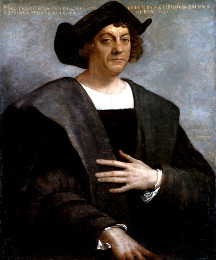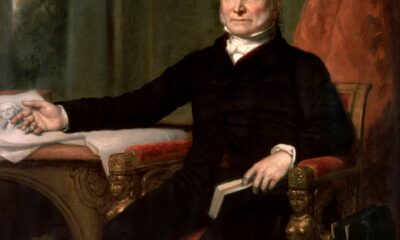Ignite the Pulpit
Columbus, gold, and leadership

When Columbus left on his voyage, he was the laughingstock of all royalty (except for Ferdinand and Isabella). When he returned, he was receiving personal invitations from men like King John II of Portugal.
QUESTION: How do you think this fed into his pride?
QUESTION: Given that John II had tried to steal the Indies from him twice, do you think pride was the reason he accepted the invitation?
COMMENT: The Bible says that pride goes before a fall. In this next chapter we certainly see Columbus’ life confirming that. His success was a tremendous accomplishment, but ironically his pride robbed him of the very fame and fortune he so desired. In spite of all he accomplished, he, through his own shortcomings, would once again became the laughingstock of all the civilized world.
Columbus tested in success
Of course King John II came to realize and lament his decision not to finance Columbus’ voyage. His regrets were visible to Columbus, who displayed no compassion on the King but instead gloated and humiliated him. Nowhere in the Bible will you be able to find an instance where this type of vanity is condoned. And so, Columbus fails another spiritual test, which was not based on failure but was based on his success.
COMMENT: Moses was also tested in success. He had successfully led the people out of Egypt after 400 years and it took only 40 days for them to revert to debauchery when Moses was on Mt. Sinai receiving the 10 Commandments. Moses was angry that the people had sinned and at first he reacted, but then he went to pray. It is at this point that the character of a true leader is revealed. While some may argue that Moses’ gut reaction was not regal, before God he displayed sacrificial leadership by offering himself as atonement for the people’s sins. (Exodus 32:25-33)
Conversely, Columbus ignored the sins of his people and did not seek atonement from God in any form. Keep this contrast in mind as we make our way through this lesson.
QUESTION: Do we have any leaders today who would offer themselves as atonement for our national sins? If you can think of one, please share with the rest of us.
IMPORTANT QUESTION: Our Founding Fathers, on the other hand, did pledge to sacrifice all they had in order to secure the blessings of liberty. What do you think is the difference between our Founding Fathers, Columbus, and today’s politicians?
QUESTION: The authors claim that during the expedition Columbus remained true to his calling and suffered the reprisals of the Pinzon brothers and the crew for the sake of God. However, do you think he persevered for the sake of God and his calling or did he persevere for the sake of his own pride? Has his subsequent behavior impacted how you have answered this question?
QUESTION: Money, position, and power. Columbus wanted to be governor of the territories he discovered. Was he equipped to fulfill that ambition? If not, what prior instances can you cite to support your opinion? I’m asking about his life before the success of the expedition. Were the indications that Columbus was more into fame and fortune than God?
Columbus returns to the New World
Columbus did show some respect for God when he returned to Spain. The first thing he did was to fulfill the vow of the pilgrimages he promised when he drew the beans during the storms on their return voyage. After his pilgrimages, he received a letter from the Royals inviting him to their winter court in Barcelona and acknowledging him as governor of the lands he discovered. Once again, Columbus didn’t have to beg for an audience with the Royals. The tables had now turned in his favor. The more Columbus was given, the more detestable he became.
When Columbus returned to Barcelona, he was practically worshiped. He bedazzled the Royals with his descriptions of the beauty of the islands and with many treasures- including parrots and a chest of golden pieces of crafted jewelry and raw nuggets of gold. Even the Pope acknowledged his triumph. He also paraded the natives in front of them as if they were part of the bounty.
QUESTION: How do you think all of these accolades affected Columbus? Did it change who he was, did it just bring out the worst of who he was, or did it reveal who he was? There is a world of difference in the answer. Think it through.
Columbus soon embarked on his second expedition, in which volunteers paid their own way for the chance of seeking adventure and gold. He soon earned the praise of his crew as the best dead-reckoning navigator of his time.
When he returned to La Navidad, things had turned ugly. Every one of the 39 crew members that were left behind were killed – either by their own hand or the natives. The interpreters found out that almost as soon as the Niña left, the crew members went on a sexual rampage and violently seized all the gold they could from the natives. Their greed and avarice led to some of them killing each other, while others were easily ambushed and overrun by the natives. With these stories, Columbus’ men turned hostile toward the Indians and toward Columbus, who had to threaten capital punishment to prevent a bloodbath.
QUESTION: The crew members, who were sailors that had been on a ship without any female companionship, were left on an island with innocent and naïve natives, who didn’t wear any clothes and did have some gold. This was a bad scenario. Should Columbus have realized beforehand that this was a recipe for disaster? Do you think he even cared?
QUESTION: Do you think that good leadership skills could have contained the tragedy or were things too far gone? And do you see a disconnect between Columbus’ navigational brilliance and what we would call “street smarts?”
QUESTION: People who are said to be “book smart” often are not “street smart.” Have you ever seen a similar disconnect in talented and bright people in your own lives? Do you think any of this applies to Columbus or was he simply so given over to the lust for gold that nothing else mattered?
From bad to worse
[ezadsense midpost]
Since Columbus obviously wasn’t a leader, either he didn’t know how to deal with the problems he now faced – or he didn’t care to. Even the promise of gold couldn’t stop the rebellion that seemed inevitable. Still Columbus didn’t turn to God; he turned to himself. Bad mistake.
Word of the debacle got back to Spain from the supply ships that were sent to the islands and Columbus’ brothers came to his rescue, whom Columbus installed as lieutenants.
Since Columbus was unable to find gold himself, he taxed the natives in gold. The Indians rebelled and the “Christians” became more tyrannical. In two years time, approximately 100,000 Indians had died or been killed by those who went to evangelize them. Twelve years later, an estimated 180,000 more had been killed or died. Columbus managed to put down the Indian uprising, of course this was an easier task with superior weapons and only 20,000 out of 300,000 survivors. However, his entire mission to evangelize the natives create enemies instead of disciples.
QUESTION: The natives were told and believed the Spaniards to be Christians. Do you think they were? What do you think makes someone a Christian?
QUESTION: Columbus didn’t seem to have any regard for the lives of the natives. Many things could have contributed to his human disconnect from their suffering. Do you think Columbus was a racism, surrendered to peer pressure, or pride and the inability to recognize his own inabilities, or something else?
QUESTION: Define racism.
An unauthorized mission
Columbus left his brothers in charge of Española and returned to Spain where he managed to convince the Royals that everything that happened was not his fault and they enabled him to return to the islands.
In Española things had gotten worse, and word of this reached the Royals, who finally sent a replacement for Columbus, Bobadilla, whom Columbus resisted. Bobadilla had him placed in chains and sent back to Spain, where the Royals once again had compassion on him but this time did not send him back to Española. The conniving Columbus planned to put together a book of prophecies in which he would make sure proclaimed that the Royals were to set the Holy Land free with Columbus, as their champion. This mission, of course, would require much gold. Thank God he never achieved that goal. However, the Royals gave in to him again and prepared an expedition for him to go exploring, with the caveat that he not return to Española. Columbus defied their will and immediately set sail for Española, where he was denied entrance. This didn’t stop him, he changed course and headed for Cuba and ended up in Central America, despite defying all odds and apparently the will of God. He eventually found the source of the gold he had been seeking for many years. The lust for gold took over and eventually gave rise to the Spanish Conquistadors, who displayed all of the moral deficiencies of the early Spanish crew members.
COMMENT: Columbus found his gold but he never owned the gold; the gold owned him. Although his journal indicates that God tried to call him back, the Bible tells us that you cannot serve two masters. This proved to be true for Columbus. He loved gold more than God. Broken and once again a laughingstock, Columbus returned to Spain, where he lamented not having the rights to the gold he believed he deserved. He didn’t lament over the debacle that he presided over. He never lamented the harm he brought upon the native people. He never lamented not evangelizing them. He died a broken man in 1506, a mere 14 years after he was one of the world’s most celebrated heroes.
Read Jeremiah 4:1-4 and 6:15-16. Apply these verses to Columbus and his expedition. God may have called Columbus but he stopped listening to God when gold came into the picture.
QUESTION: Many say that when things go as badly as they did for the natives, that God does not rule in the lives of men. If it was God’s will that Columbus embark on this voyage, was it His will that the natives be abused? Think about Adam and Eve in the Garden. God provided for them and He made His will known to them. They chose to disobey. There were consequences to their disobedience. Columbus chose not to listen to God and receive His correction. There were consequences for him as well as for others.
QUESTION: How does the life of Columbus speak to you about free will?
COMMENT: Matthew 24:10-13 tells about the repercussions of lawlessness. Columbus did not persevere. He abandoned his calling, shut his ears to God and indulged lawlessness.
QUESTION: Had Columbus remained true to his calling and to God, how do you think that would have affected Central and South America today?
QUESTION: From our vantage point we can see what went wrong in Columbus’ time. Lawlessness did abound, and there was a disconnect between right and wrong. Do you see this happening in our culture today? Think about the Zimmerman case and all the atrocities in urban areas that go unnoticed – as if it is invisible to the eyes of those that live there. Have they become accustomed to the violence and the debauchery as well? They seem to know how to hate but have their hearts become cold?
QUESTION: Columbus’ success was dwarfed by his failure as a human being. Others who have great opportunity have also failed in many ways. Do you think Barack Obama would qualify as someone who has had great success and had an opportunity to do much good but failed miserably? If so, how?
CLOSING COMMENT: Mickey Mantle became a Christian shortly before he died. He made a very sad statement before passing away. He acknowledged that he was given so much and had done so little with it. Apply this to your own life. Have you done as much as you could with the gifts and talents God has given you? Have you turned a blind eye to things you could have impacted for the greater good? Have you paid more attention to the superficial things in life than to the things of God?
Assignment: Read Chapter 4 of [amazon_link id=”B004478FSY” target=”_blank” container=”” container_class=”” ]The Light and the Glory[/amazon_link][amazon_enhanced asin=”B004478FSY” container=”” container_class=”” price=”All” background_color=”FFFFFF” link_color=”000000″ text_color=”0000FF” /] in preparation for next week’s lesson.
[ezadsense leadout]
RoseAnn Salanitri is a published author and Acquisition Editor for the New Jersey Family Policy Council. She is a community activist who has founded the Sussex County Tea Party in her home state and launched a recall movement against Senator Robert Menendez. RoseAnn is also the founder of Veritas Christian Academy, as well as co-founder of Creation Science Alive, and a national creation science speaker.
-

 Civilization2 days ago
Civilization2 days agoWhy Europe Shouldn’t Be Upset at Trump’s Venezuelan Actions
-

 Accountability5 days ago
Accountability5 days agoWaste of the Day: Principal Bought Lobster with School Funds
-

 Executive3 days ago
Executive3 days agoHow Relaxed COVID-Era Rules Fueled Minnesota’s Biggest Scam
-

 Constitution4 days ago
Constitution4 days agoTrump, Canada, and the Constitutional Problem Beneath the Bridge
-

 Christianity Today2 days ago
Christianity Today2 days agoSurprising Revival: Gen Z Men & Highly Educated Lead Return to Religion
-

 Civilization3 days ago
Civilization3 days agoThe End of Purple States and Competitive Districts
-

 Executive3 days ago
Executive3 days agoWaste of the Day: Can You Hear Me Now?
-

 Executive4 days ago
Executive4 days agoWaste of the Day: States Spent Welfare in “Crazy Ways”














Good stuff here!Much to ponder.Thank you for sharing this Terry.
Sharon Cox Goemaere liked this on Facebook.
[…] Columbus, gold, and leadership (cnav.news) […]